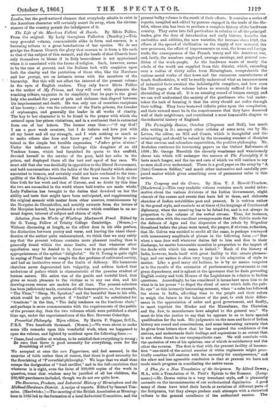The Life of the Marehesa Falletti di Barolo. By Silvio
Pellico. From the original. By Lady Georgians Fullerton (Bentley.)—This very graceful volume, commendable alike in form and essence, is a becoming tribute to a great benefactress of her species. We do not grudge the Roman Church the glory that accrues to it from a life such as that of the subject of this memoir, and the heads of that Church have only themselves to blame if in Italy benevolence is not appreciated when it is associated with the forms of religion. Such, however, seems to be the case at present, and the Italians look with suspicion upon both the charity and the patriotism of those who, like the Marchese and her pnoteg4, are on intimate terms with the members of the hierarchy. But this will not affect the interest of the present volume in the eyes of English readers. They only know Silvio Pellico as the author of My Prisons, and they will read with pleasure the touching tribute, exquisite in its simplicity, that he pays to the great lady who soothed the years of pain and sickness that elapsed between his imprisonment and death. He was only one of countless recipients of her bounty ; she was the reformer of the Turin prisons, the founder of orphanages, and generally the leader in all works of charity. The key to her character is to be found in the prayer with which she entered upon -her prison visitations, and in a sentiment that is extracted from one of her letters. The former runs thus :—" 0 my God!
I am a poor weak creature, but I do believe and love you with all my heart and all my strength, and I wish nothing so much as to make others also love and know you ;" and the latter is con- tained in the simple but forcible expression, " J'adore qu'on m'aime."
Under the influence of these feelings this daughter of an old Vendean house, which had furnished its quota to the scaffold, devoted herself to the service of the poor, held her salon in the prison, and displayed there all the tact and esprit of her race. We must add that she was decidedly in opposition to the liberal Government, and held conversations with the ladies of the Royal family which almost amotuited to treason, and certainly could not have conduced to the tran- quillity of the King's household. But there was room in Italy at the time both for her work and that of Cavonr, and no doubt by this time the two are reconciled in the world where half-truths are made whole.' Lady Fullerton has brought to the duties that devolved on her the ability and taste that might have been anticipated, and supplementing the original memoir with matter from other sources, reminiscences by the Marquise de Chenaleilles, and notably extracts from the letters of the Marquise herself, has produced a volume which combines in an un- usual degree, interest of subject and charm of style.






























 Previous page
Previous page